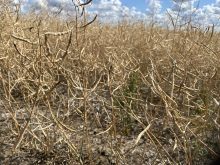Canadian farm leaders often complain that in international affairs, their country suffers too much from the boy scout syndrome.
They mean that Canadian decisions too often are made on the assumption that rules must be obeyed to the letter and that everyone else will do the same.
The aftermath of the last world trade agreement to reduce farm subsidies is an example.
Canada used the 1994 agreement to slash most farm support payments, setting its politicians to work to sell the cuts as a Canadian act of goodwill and responsible world citizenship. The United States and Europe instead set their lawyers to work finding out how much room they had to continue farm subsidies.
Read Also

Rural emergency room closures continue to be vexing problem
Staffing issues are at the root of disruptions and closures in hospital emergency departments, both in rural and urban Canadian locations.
The answer was “lots of room” and U.S./ EU farm support far exceeds Canada’s.
Boy scouts, salute the flag.
Last week provided another classic example, thanks to an American determination to stand by its highly protected sugar industry, trade rules be damned.
Like Canada, the Americans followed the 1994 world trade deal to end quantitative import controls by slapping prohibitively high tariffs on import-sensitive commodities. One protected U.S. commodity was sugar. A tariff line was established high enough to block imports of any product with high sugar content that would compete with American product.
A Michigan firm with a plant in Windsor, Ont. figured out a way around the tariff. It created a molasses-sugar syrup concoction that slips under the tariff definition of prohibited.
In 1995, U.S. Customs said it could be imported virtually duty free because it did not fall within the tariff line definition. The company takes the product from Windsor to its Taylor, Mich., plant, separates the sugar syrup from the molasses and sells the liquid sugar to U.S. ice cream and candy makers.
The sugar industry howled. The U.S. government decided it had made a mistake in 1995 and launched steps to reverse the ruling and to reclassify the product as subject to prohibitive tariffs.
Canada has complained this violates the American trade commitments and has started consultations that could lead to a long and costly World Trade Organization legal fight. The American attitude is simple: Sue me. That will take years and meanwhile, our sugar guys will be happy.
Contrast that with the Canadian government’s response when dairy farmers made the same request.
An importer created a butteroil-sugar blend designed specifically to circumvent a Canadian tariff line drawn up in 1994 to protect the dairy industry. Dairy Farmers of Canada demanded the government change the rule by imposing a tariff, since the spirit of the law was being violated.
Ottawa said no. A rule is a rule and Canada must live by its commitments.
Dairy Farmers have spent tens of thousands of dollars fighting that political stance at the Canadian International Trade Tribunal and now in the Federal Court of Canada.
The government can proudly say it lives by the rules. Meanwhile, the American sugar industry is protected from a small import challenge and Canadian dairy producers are not.
Boy scouts, you say?















